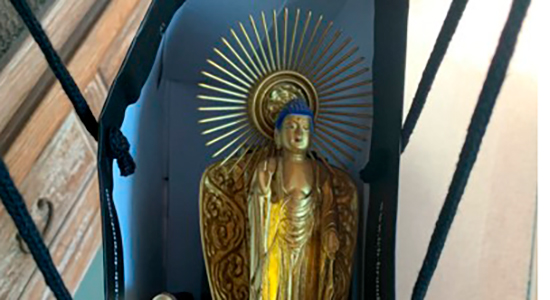REFUSE: Disrupting Buddhist circular economies – excess and abandonment in contemporary Japan
REFUSE: Disrupting Buddhist Circular Economies is a 2-year-long research project focusing on the practices of giving, the material excess they generate, and the circular economies and cosmologies they are part of in depopulating Buddhist temple communities in contemporary Japan.

This project explores environmental impacts and socioeconomic disruptions to Buddhist practices of generosity in Japan. Its focus is on “Buddhist excess” to demonstrate how the Buddhist circular economy of giving generates material excess and abandonment practices in contemporary Buddhist temple communities in Japan. To meet its central aim – to advance our understanding of how demographic ageing and changing consumption patterns affect circular economies – the project takes Japan as an exemplary case to highlight how the practices of Buddhist giving generate, preserve, and circulate religious value, and how material things move through, drive, and disrupt the Buddhist circular economy. Such practices of generosity reveal tensions concerning material, spiritual, and emotional disposal, and recirculation of Buddhist things.
Building on the methodology of tracing ‘biographies,’ the project follows Buddhist gifts along the relational networks of Buddhist ‘affective economies’ from the acts of gifting to recirculation of their excess and their abandonment and disposal. As such, it will demonstrate the relational and emotional value of such gifts for understanding the workings of Buddhist circular economy and its fragility in the world’s fastest ageing society. At the same time, it will interrogate the entanglement of affective and circular economies by asking what and when can and cannot morally become waste and what and when ought to be perpetually (re)circulated and (re)valued.
REFUSE connects the contemporary debates on waste and environmental ethics to religious practice, as well as material religious histories, and demographic transformations that challenge and reshape our social and ecological networks of dependency. The central aim of this project is to advance our understanding of how demographic ageing and changing consumption patterns affect circular economies. Specifically, it aims to illuminate how Buddhist practices for processing accumulation and abandonment of Buddhist gifts are key to understanding contemporary Buddhism, and the wider issues of consumption, recycling, and aspirational non-waste economies. It thus interrogates Buddhist practices of giving as forces that not only generate and handle excess and abandonment, but also challenge the viability of the circular economy ideal in a broader sense by enabling waste production. This project has four main themes and associated questions:
- DISRUPTION focuses on how demographic transformations disrupt and reform the Buddhist circular economy, how dependent the circular economy is on cosmology and kinship, and with what outcomes?
- EXCESS is the leading theme of the project and explores how Buddhist temples deal with an excess of gifts, especially food donations, and how the practical and moral issue of food loss/waste is handled in Buddhist temple kitchens?
- ABANDONMENT relates to the projects focus on the project’s underpinning practice of refusal of inherited karmic bonds and the associated troublesome materiality. Its focus is on the ways in which the life stories – their material and affective dimensions – of Buddhist gifts define how material abandonment is handled in Buddhist temples, and why and how people abandon troublesome Buddhist materiality when the intergenerational circulation of symbolic/karmic value fails?
- AFFECTS is oriented towards the layering of emotions about the objects and the related practices of care. It seeks to unravel how and the affective dimensions of and emotions – negative emotions of fear, guilt, and shame in particular – around Buddhist excess shape its past, present, and future, and how they can enable rather than disrupt Buddhist circular economies?
By focusing on ‘Buddhist excess’, the project considers what, how, where, and when can morally, emotionally, and practically become waste and what ought to remain perpetually (re)circulated.
At the time when 'age of waste,' 'discard society' and 'throwaway culture' have become the defining features of our time, REFUSE forwards the understanding of the environmental impacts of religious practice and the cultural and socio-economic making and managing of troublesome material excess in the hyper-ageing Japan. It draws attention not only to the waste-making practices in Buddhism and the need to address the environmental ethics in religious practice, but also to the importance of material stewardship of discarded objects, the practices of care for matter that has fallen out of place and out of time, and the need to learn how to live with the material excess that cannot always be transformed into waste or transformed away easily.
REFUSE is an inquiry into the religious, environmental and demographic transformations in our societies: it queries how the circular economy ideal that underpins practices of generosity and inherited care in Buddhism is threatened and reorganised when the networks of dependency and obligation required for it to work are challenged by depopulation and demographic ageing, thus producing sacred and other forms of excess. It also adds to a more nuanced public debate about the multifaced nature of Buddhist material presence and charting a course for research to recognise the environmental footprint of and the issues of consumption, material production, and labour in religion today. The intersection of Buddhism, economies of value, and discard studies is an emerging subject area which is gaining currency thanks to its potential for deepening our understanding of current challenges around environmental and demographic transformations.
Researcher
| Name | Title | Image |
|---|---|---|
| Kolata, Paulina | Marie Curie Fellow |
|
Funding

Marie Skłodowska-Curie Actions Postdoctoral Fellowship - the European Research Executive Agency (REA) under the Grant Agreement No 101067602
Project period: 2023-2025
Contact: Dr Paulina Kolata
